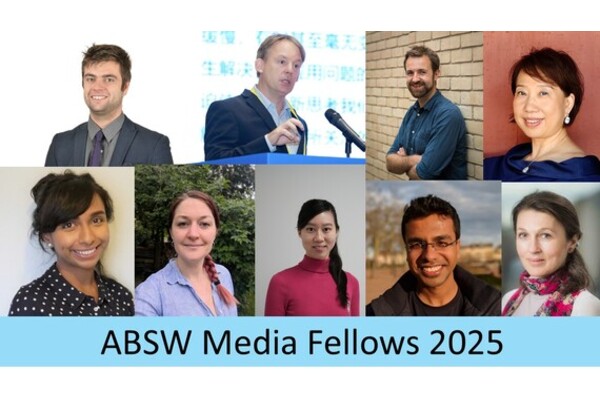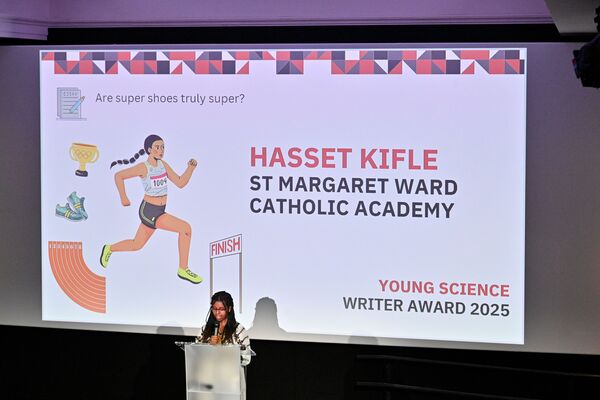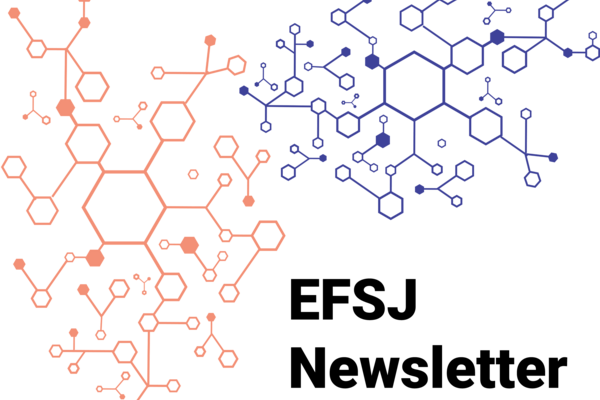Updated on 4 November 2025, with details of placements and work produced for each Media Fellow.
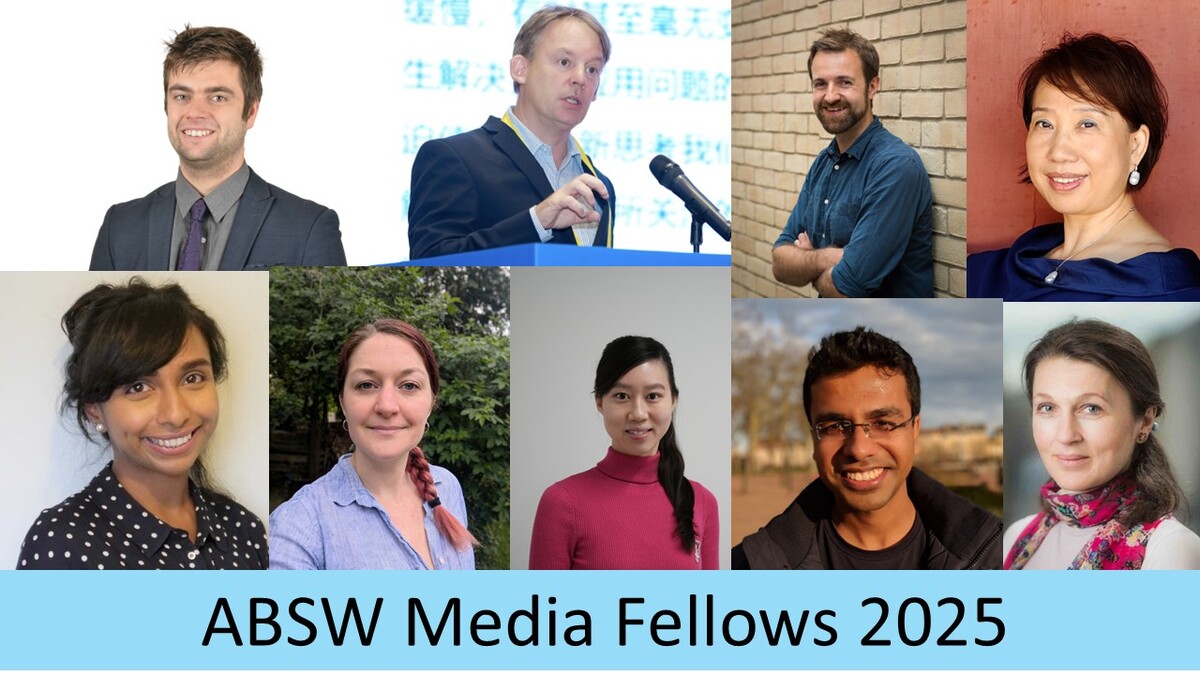
Previously run by the British Science Association, ABSW media fellowships provide a unique opportunity for practising scientists, clinicians, and engineers to spend two to six weeks working at the heart of a media outlet such as the Guardian, BBC Radio Science Unit or IFLScience.
Aimed at giving scientists the confidence to engage with the media, and to bridge the gap between journalists and scientists, the scheme also tackles mistrust and misrepresentation, and builds understanding between science and society.
Any UK institution from Universities to professional bodies can offer an ABSW media fellowship to its academics. In 2025 Cranfield University and University of Hertfordshire have joined the scheme. Returning to the scheme for a further year are University of Bath, Sainsbury Wellcome Centre, UCL Global Engagement, and UCL Engineering.
Speaking of the fellowships, April Cashin-Garbutt, Head of Research Communications and Engagement at the Sainsbury Wellcome Centre at UCL said:
We’re delighted to support the ABSW Media Fellowships again this year, following an excellent placement at IFL Science in 2024. This scheme provides our scientists with a fantastic opportunity to gain hands-on experience and enhance their communication skills. The experience has proven very valuable at both the individual and institute level, thanks to the insights shared with our community.
Professor Ian Johnston, Director of the Biodetection Technologies Hub, University of Hertfordshire said:
The University of Hertfordshire is thrilled to support Dr Etelka Chung as she embarks on the ABSW Media Fellowships scheme in 2025. Her passion for transforming intricate scientific ideas into captivating and relatable content is set to enhance public confidence in science and engineering, sparking inspiring and impactful conversations.
In total nine academics will take part in the scheme this year. The Fellows have taken part in a 'Journalism 101' course and been matched to a media host. Some placements have already started with others due to take place later this summer. Once all placements are completed the Fellows will join a development day to discuss lessons learned and how they might take forward this learning within their institutions.
In the past media fellows have continued to produce content for the media, used their learning with students and colleagues to improve media relations between academia and journalists, and some have even developed specific posts within their institution to promote productive media relations.
Meet the ABSW Media Fellows 2025....
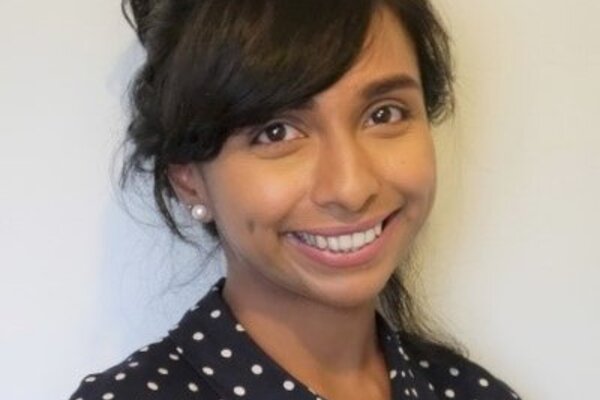
Cini Bhanu
Dr Cini Bhanu is a GP in North East London and an Academic Clinical Lecturer based at the Research Department of Primary Care and Population Health, UCL. Cini has a broad research portfolio in ageing and improving care delivered in General Practice for older people. She has led projects on blood pressure management in older adults, dementia care, healthy hydration and health inequalities. Her PhD was on the topic of safe blood pressure management in older people on multiple medications and postural hypotension. Cini also has extensive experience with diverse patient and public engagement using creative methods.
Of her ABSW media fellowship Cini said:
I hope to get hands-on experience to understand the pathway between health research and science communication and learn how we can work together to engage the public, create impact and empower people lead healthier lives
Cini has been placed with the BBC Science Unit in Cardiff and her fellowship is supported by UCL Global Engagement.
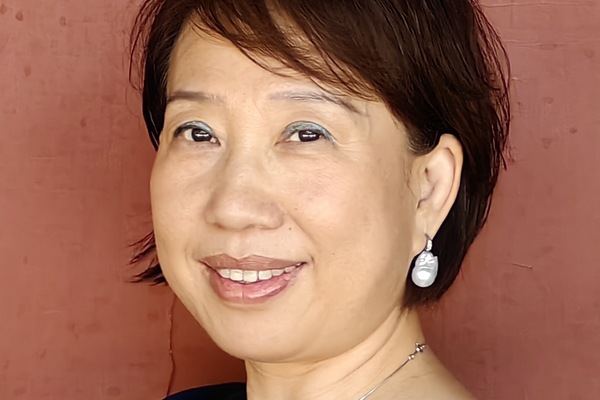
Tao Cheng
Tao Cheng (HDR, PhD, FRGS, FICE, CEng, FAcSS) is Professor of Geoinformatics in the Department of Civil, Environmental, and Geomatic Engineering at University College London (UCL). She is a Fellow of the Academy of Social Sciences and the Institution of Civil Engineers, a Chartered Engineer (CEng), and a member of the College of Experts for the UK Department for Transport. She previously served as Theme Lead for Mobility at The Alan Turing Institute.
Professor Cheng is the Founder and Director of the UCL SpaceTimeLab (www.ucl.ac.uk/spacetimelab), a world-leading research centre pioneering SpaceTimeAI to generate actionable insights and foresights from spatio-temporal data for government, industry, and society.
Her research interests span AI and big data, network complexity, and urban analytics, with applications in transport and mobility, safety and security, public health, business intelligence, and natural hazard prevention. She has secured over £25 million in UK and EU research funding and led major collaborations with partners including Transport for London, the Metropolitan Police Service, Public Health England, and Arup. She has published more than 350 research articles and received multiple international best paper awards.
Tao has been placed with the BBC Science Unit in Cardiff and her fellowship is supported by UCL Engineering.
Tao provided background checking and research for an episode of Science in Action: A mystery satellite has been jamming GPS in Europe
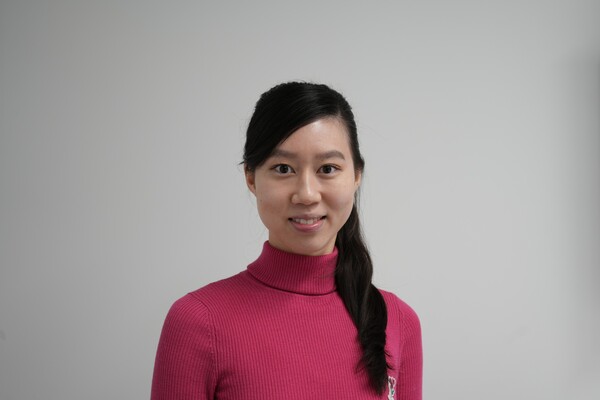
Etelka Chung
Etelka is a Research Fellow at the Wolfson Centre for Biodetection Instrumentation Research based at the University of Hertfordshire. To address global issues related to air quality and microbial threats, Etelka applies her background in materials and biomedical sciences to focus on aerosol collection and biodetection. As part of a multidisciplinary team of scientists and engineers within the Biodetection Technologies Hub, funded by Research England, she is particularly interested in developing novel collection methods which will benefit society through better monitoring of airborne pathogens to reduce infections, across a range of applications addressing human, animal and plant health.
Of her ABSW media fellowship, Etelka says:
I hope to learn techniques to disseminate my research through stimulating ways for a wider audience outside academia. As someone keen on creative arts, I hopes to gain knowledge of unique and fun ways to portray scientific content.
Etelka has been placed with IFLScience and her fellowship is supported by University of Hertfordshire.
You can find all of Etelka's work for IFLScience here:
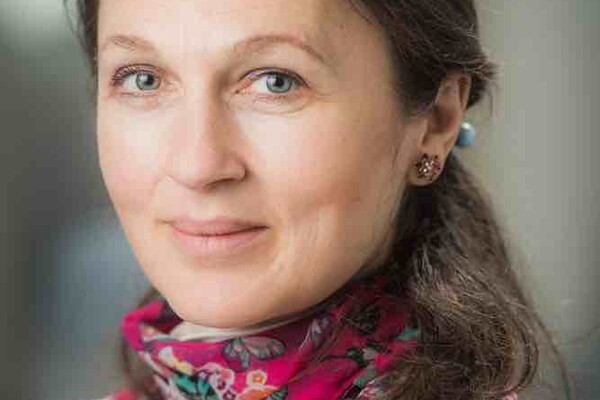
Ivana Drobnjak
I am a Professor of Computational Healthcare and a Director of the Undergraduate Program at the Department of Computer Science, University College London. My main research interests are in developing mathematical and computational methods with applications in medicine and healthcare. My research career started at the University of Oxford where I completed my MSc at the Oxford Centre for Industrial and Applied Mathematics, and DPhil at COMLAB & Centre for Functional MRI of the Brain (FMRIB). I have since worked on computational and AI modelling in medical applications, medical imaging, microstructure imaging and digital health. My goal is the translation of these methodologies for improving wellbeing and health.
I am in particularly focused on ethical, human aligned AI technologies. I work on minimising bias, minimising energy expenditure, transparency and explainability of AI models. I am a member of UNESCO Chair in AI and work in partnership with UNESCO on these different areas. I also collaborate with a range of companies. One of the topics I am in particularly interested in is increasing number of women in the tech industry. Currently, women make only 22% of AI teams and this goes below 10% for the leadership positions. I believe that more diverse teams are better able to create systems that are truly aligned with human values - which is what we need AI to become at its core.
Ivana has been placed with the science desk at The Guardian and her fellowship is supported by UCL Engineering.
Read Ivana's bylined articles:
Potato evolved from tomato ancestor researchers find
Ultrasound helmet could offer non invasive treatment for parkinsons study shows
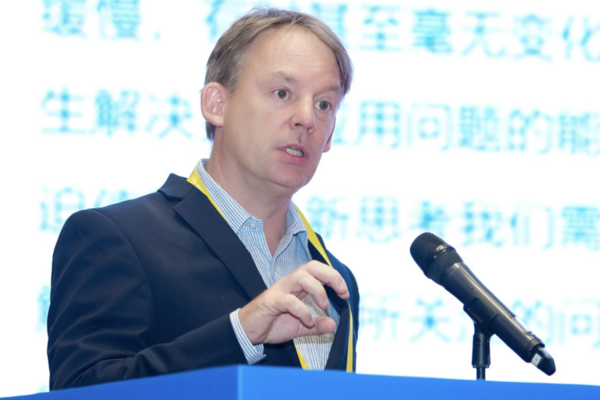
Ian Eames
Ian Eames is Mechanical Engineer at University College London. He is a Professor of Fluid Mechanics which is a discipline that is concerned with the movement of gases and liquids. This subject touches on areas as diverse as diseases, how the body functions, turbulence, aerodynamics, weather systems on Earth and other planets, transmission routes of COVID, making pancakes, tsunami, all of which are governed by the same or similar physical laws of nature.
Ian has been placed with the environment desk at The Guardian and his fellowship is supported by UCL Engineering.
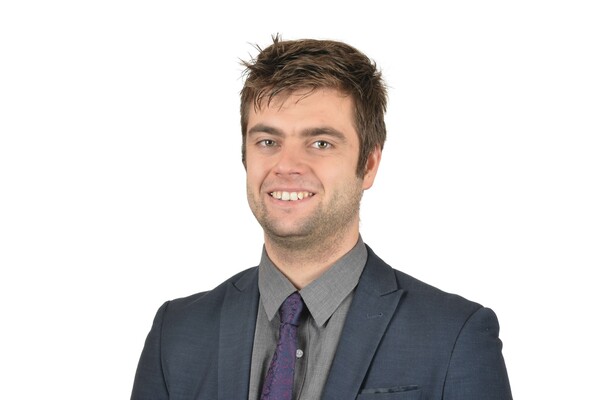
Francis Hassard
Dr Francis Hassard is a Reader in Public Health Microbiology at the Cranfield Water Science Institute, Cranfield University. A Fellow of the Royal Society of Biology, Chartered Biologist and Senior Fellow of the Higher Education Academy, he investigates how biological treatment technologies and next-generation microbial sensing can secure safe drinking-water while minimising chemical and energy inputs. His research spans virus fate and inactivation in treatment trains, real-time flow-cytometry monitoring, and wastewater-based epidemiology for rapid public-health intelligence. Francis’ work has informed full-scale innovations now adopted by UK water utilities and underpins Defra-funded surveillance programmes protecting vulnerable communities.
On his hopes for the ABSW media fellowship Francis said:
As a Media Fellow I want to translate the invisible world of water microbiology into stories that resonate with everyone. Clean water is fundamental to health, yet the science behind it rarely makes headlines. By working alongside journalists, I hope to learn how to craft narratives that move data from microscopes and sensors into compelling insights, encouraging action on climate-resilient, low-impact water treatment.
Francis has been placed with BBC Future and his fellowship is supported by Cranfield University.
Read Francis' bylined articles:
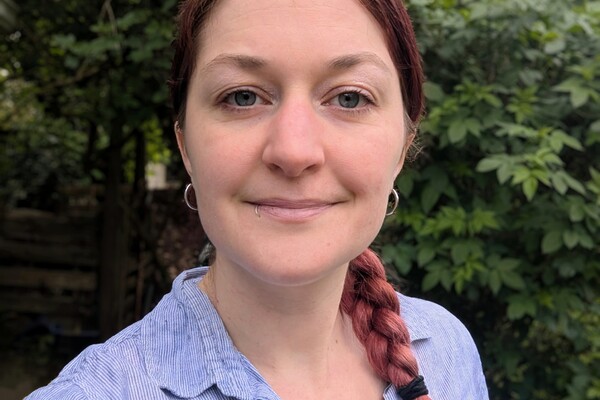
Svenja Nierwetberg
Svenja Nierwetberg is a postdoctoral fellow at the Sainsbury Wellcome Centre for Neural Circuits and Behaviour at University College London. She contributes to the Aeon project, a large-scale collaborative initiative looking for new ways to studying natural mouse behaviour and its neural correlates over extended timescales. In addition, she leads the Neuronauts Programme, an educational outreach initiative for secondary school students that introduces them to the fundamentals of computer science and engineering.
Of her ABSW media fellowship Svenja said:
I hope I'll be able to refine my ability to communicate scientific ideas to different audiences and through different media, moving beyond traditional academic papers. I'm especially excited to learn more about working with audio formats, since podcasts and radio are such a fantastic way to bring scientific ideas to a broader audience
Svenja has been placed with the science and health desk at The Financial Times her fellowship is supported by Sainsbury Wellcome Centre.
Read Svenja's bylined pieces:
UK wants to end pricing feud with drugs companies, says science minister
Royal College of Psychiatrists calls for wider access to psychedelic treatments
Exposure to air pollution increases risk of dementia, scientists say
Triple dose of Novo Nordisk drug delivers 19% weight loss in trials
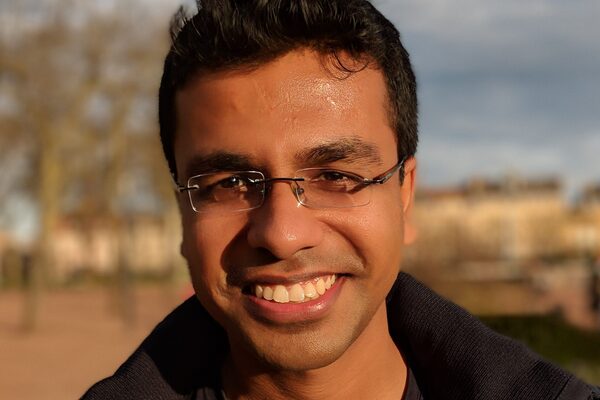
Adwait Sharma
Adwait Sharma is a Lecturer (Assistant Professor) in Computer Science at the University of Bath, UK, where he leads the Advanced Interaction and Sensing Lab. His research focuses on developing novel design and technical solutions for scenarios where traditional input methods fall short—particularly when users' hands are occupied. Adwait holds a PhD from Saarland University (Max Planck Institute) in Germany and has worked with research groups across six countries, including the National University of Singapore, the Media Interaction Lab in Austria, and Meta Reality Labs in Toronto. His work has been published in top-tier venues such as TOCHI, CHI, UIST, and DIS. Learn more at: https://adwaitsharma.com.
On his ABSW media fellowship Adwait said:
I'm truly honoured to be selected as an ABSW Media Fellow and grateful to the University of Bath for this incredible opportunity. My research in Human-Computer Interaction focuses on making technology more intuitive, accessible, and meaningful in people’s lives. This fellowship provides a valuable platform to enhance my science communication skills and learn how to share these ideas more effectively through the media. By working closely with media professionals, I hope to effectively translate research into engaging narratives, and foster meaningful dialogue between researchers and the wider public.
Aidwait has been placed with Research Professional News and his fellowship is supported by the University of Bath.
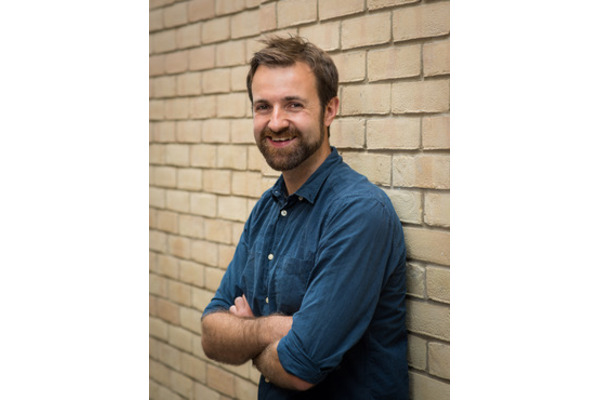
Kit Yates
Kit is an author, broadcaster and academic specialising in the role of mathematics in everyday life. Kit completed his PhD in mathematics at the University of Oxford and is now Professor of Mathematical Biology and Public Engagement at the University of Bath.
He is a prominent commentator on the role of mathematics/science in society, writing regularly for a range of media outlets and appearing on radio shows, TV news shows and documentaries.
Kit is one of the core scientists that forms Independent SAGE, providing independent scientific advice to policy makers and the public on covid throughout the pandemic.
On his ABSW media fellowship Kit said:
I’m really excited about the opportunities that the ABSW media fellowship will bring. It’s a great chance for me to extend and broaden my media experience and to see how things work behind the scenes.
Kit has been placed with LiveScience and his fellowship is supported by University of Bath.
Read all of Kit's articles and opinion pieces for LiveScience
Are you an academic institution or professional body that would like your academics to take part in the ABSW media fellowships scheme in 2026? Then download our brochure below and get in touch with the ABSW Executive Secretary Sallie Robins to discuss.
Could your media outlet host an ABSW Media Fellow? Download our brochure below to find out more and get in touch with ABSW Executive Secretary Sallie Robins to discuss.

